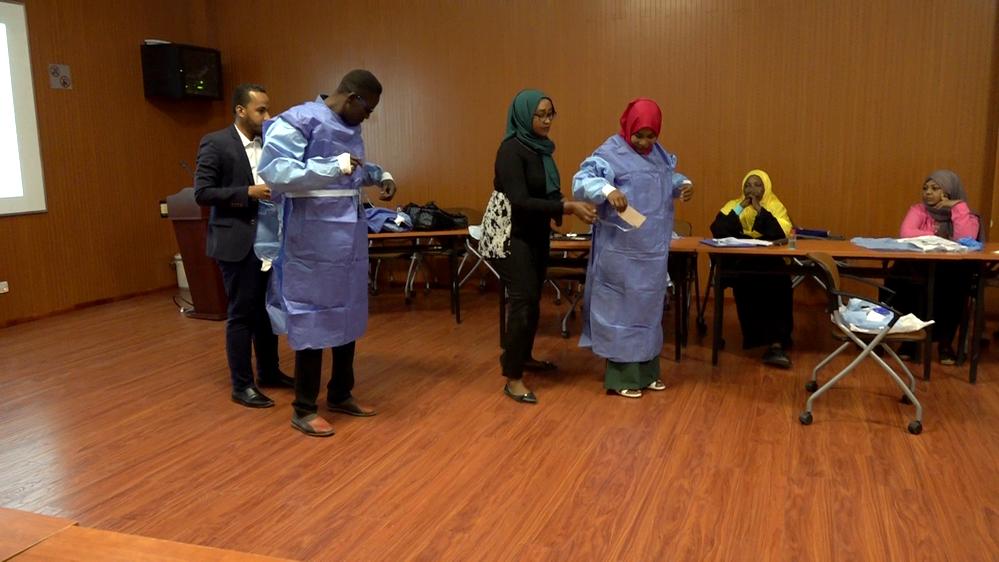MSF is concerned about the spread of COVID-19 in Sudan and how it could affect the capacity of the health system, including the impact the disease could have on vulnerable people. We are particularly worried about immunosuppressed patients, people with other diseases and communities living in congested and precarious settings like refugees, internally displaced people and migrants.
This is an unprecedented global crisis and MSF is doing everything we can to respond to COVID-19 in Sudan and around the world. We have developed contingency plans to keep our regular medical programmes running, as we fear that worldwide restrictions on movements of people, stocks and medical supplies may impact our operations and our emergency response capacity. In Sudan, we are working with the Ministry of Health (MoH), the World Health Organization (WHO) and other health actors to monitor and respond to the changing situation.
MSF is running trainings on infection prevention and control (IPC) and how to improve the flow of patients and staff inside the health facility. Together with the MoH and the WHO, we provided these trainings for healthcare professionals in leadership roles at 90 major hospitals in Khartoum state. MSF also directly provides daily trainings to health workers including bed-side trainings and mentoring, in the health facilities we support.
After the trainings, MSF provided onsite technical support to improve ward and triage circuits and IPC measures in health structures, developing clear action plans for an outbreak of COVID-19. MSF has also trained MoH staff who are subsequently conducting trainings in nine priority states in Sudan.
At the Omdurman Teaching Hospital, the largest hospital in Sudan, MSF deployed a team of more than 60 staff. MSF is working in the emergency department and closely with the MoH in the management of initiatives established to cope with COVID-19. MSF also runs a mobile COVID-19 unit that supports other facilities and works on early detection and prevention of the spread of the disease.
In MSF projects across Sudan, we have put in place safety and hygiene measures to avoid the emergence of cases among our staff. We have also developed quarantine procedures for those who develop symptoms, to ensure that our staff can continue to safely treat patients.
We are also supporting the MoH to set up and manage isolation centres in two towns in East Darfur and South Kordofan states (Ed Daein and Dilling). Our teams are working on COVID-19 preparedness and preventive measures in all our projects, in order to safely isolate and treat suspected patients who may seek treatment in our health facilities.
MSF teams across Sudan are conducting health promotion and awareness sessions with patients and the local community, or at non-MSF primary healthcare centres.
Regular programmes continue
MSF remains committed to providing essential and lifesaving health services in the areas where we work and is trying to ensure that all supplies and medications are available for our patients and staff in the facilities we run and support.
MSF continues to carry out regular medical activities in Khartoum, North Darfur, East Darfur, White Nile, Al-Gedaref and South Kordofan states. We run hospitals and health centres and support MoH facilities, and carry out a wide range of activities to provide primary and secondary healthcare to local communities, internally displaced people and refugees.
Our activities range from treating children with malnutrition and assisting deliveries to providing care for chronic infectious diseases like TB and HIV and neglected conditions like kala azar.
In 2019, we also launched several emergency interventions including referring and treating people affected by clashes during the sit-in protests in Khartoum, assisting people affected by floods in Khartoum and White Nile states; tackling outbreaks of disease such as malaria in North Darfur state, and cholera in Blue Nile, Sennar and Khartoum states; and responding to outbreaks of measles with mass vaccination campaigns and treatment programmes in East Darfur and Al-Gedaref states. At the beginning of 2020, we responded to recent displacements in West Darfur and North Darfur.
